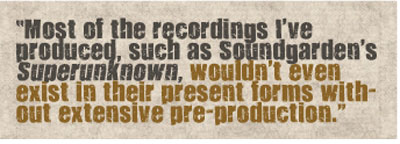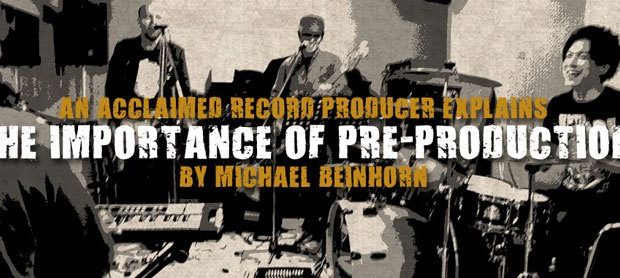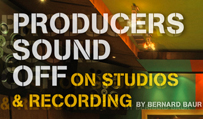A few months ago I met with a band who were planning their next recording.
We began discussing time frame and logistics in order to figure out how their time and money would be best spent. At some point in the conversation, I casually enquired about how many days they had allotted for pre-production. Slack-jawed and confused, to a man, the band and their management all stopped speaking and stared at me as if I’d just recited a sonnet in Ancient Greek.
“Pre-production? What’s that?”
Over the past 10 years, I’ve become increasingly surprised by how many artists are ready to waltz straight into a recording studio without doing pre-production or prep-work. Still more surprising is how often people who comprise the support teams of many artists––such as managers, A&R, publishers, even some record producers––completely ignore pre-production because they figure it’s unnecessary or a waste of time.
A Few Basic Premises
Actually, pre-production is one of the most essential stages of a recording project—perhaps the most essential. I see it as an insurance policy which guarantees that every aspect of every song I’m producing will be functioning properly (and the band/artist will be performing them as flawlessly as possible) by the time recording begins.
I can summarize the process of pre-production by breaking it down into four parts: analysis, discovery, revision and implementation/rehearsal. First, the music is analyzed; through that analysis, flaws are discovered; through discovery of these flaws, repairs are made and through rehearsal, the repairs are implemented and the music is improved.
As well as improving an artist’s music, pre-production helps direct him to work methodically and, thereby, smarter. By introducing organization into the creative process––which, by its very nature, can be highly disorganized––pre-production saves time on a recording project (which also means saving money, and that is especially beneficial for artists with small budgets).
It also provides an opportunity for the artist(s) and the producer to work together under “real world” conditions, instead of initializing their working relationship in a recording studio. This approach tends to set a better tone for the rest of the project.
Of course, the pre-production process can be difficult and even awkward at times. There’s nothing comfortable about having your babies––the fruit of your creative womb––rent asunder by someone you barely know and don’t yet fully trust.
However, the objective examination of your material prior to recording is also a necessity. In over three decades of producing records, nearly every artist I’ve worked with has acknowledged that the pre-production work we did played an essential role in taking their work to the next level. Most of the recordings I’ve produced––such as Soundgarden’s Superunknown––wouldn’t even exist in their present forms without extensive pre-production. And that is the end result that always justifies the means.
Analysis and Discovery
Since I’m producing the artist’s music, I need to know it intimately. By listening to the artist’s demos, I develop an impression of the material and of the artist as a creative individual. This means I have to be everything from a songwriter to an arranger, to a psychoanalyst.
I listen to all the music we will be recording, as well as previous work the artist has done (including material he may have that is in various states of completion). All of this gives me greater insight––as well as context––to the music—and the artist. By simply being aware of how the music is making me feel as I listen to it (whether that’s good, bad or indifferent) the impressions I form about it come naturally.
The listening process initiates an internal dialog in me. That internal dialog involves questions such as:
• What do I feel is the artist’s intent?
• What is he saying––or trying to say––through his songs?
• How does he project himself into his songs?
• Am I getting a complete sense of who he is, or is something missing/being hidden?
• What is this artist’s strongest asset?
• What is he best at?
• What is his weakness?
• Does he rely on his strongest or his weakest asset to express himself musically?
 I also start keeping notes that include my thoughts about the material (and fixes for problems I’m encountering), as well as the internal dialog and any additional impressions I may have. I also keep notes about how the band play together and how they use instrumentation to facilitate (or impair) each song. All these notes become an initial jumping-off point for the work we will be doing in pre-production.
I also start keeping notes that include my thoughts about the material (and fixes for problems I’m encountering), as well as the internal dialog and any additional impressions I may have. I also keep notes about how the band play together and how they use instrumentation to facilitate (or impair) each song. All these notes become an initial jumping-off point for the work we will be doing in pre-production.
I also make a habit of checking in with the artist to share my ideas, so he can start applying some of them to his songs. Initially communicating one on one is sometimes more relaxed than doing this while surrounded by a group of people in a rehearsal room. This makes it easier for the artist to feel comfortable with me and thereby, more receptive to input.
After a few weeks of prep-work, we are ready to begin pre-production.











